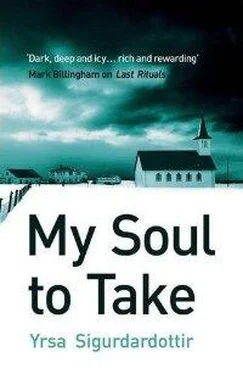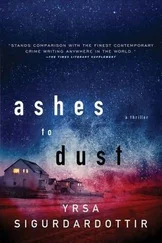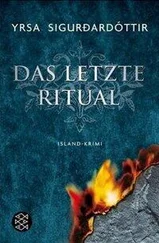“How odd,” Lára said. “He’s only come back for a few flying visits since he moved to Reykjavík all those years ago.”
“Well, I never,” was all Thóra could think to say. “Could he have been so unhappy about the baby that he . . .” She hesitated, searching for a suitable phrase. Adults were one thing, but babies quite another “That he somehow had the child adopted after Gudný died, or simply . . . disposed of it?” She hoped her euphemism would be clear enough.
“I don’t know,” said Lára. Her elderly voice faltered. “Heavens, I can’t believe anyone could do such a thing. Magnús was spineless, yes, but evil? I just don’t know. I can’t really imagine anyone behaving that way. They wouldn’t be shown any mercy in our society. Not today, and not back then.” She stopped to blow her nose. “Then there was your other question—about the coal bunker. I had a think about that and remembered that both farms switched to electrical heating before I moved away, which everyone thought was very posh. Bjarni set up a small generator by one of the waterfalls on the mountainside, north of the main road. I don’t know if it helps you at all, but both farms stopped having to bother with coal then and the coal bunkers were never used again.” Talking about something as down-to-earth as central heating seemed to restore the strength to Lára’s voice, and she spoke now with no hint of sadness. “In the box where I kept Gudný’s letter I found an old photo of the two of us behind the farm, and when I looked at it more closely, all this came back to me. You can see the coal hatch and the memories just flooded back.”
Thóra interrupted her. “When you say ‘behind the farm,’ which farm do you mean?”
“Kirkjustétt,” Lára said. “We didn’t go to Kreppa much in those days. Bjarni and Grímur were barely on speaking terms and I’m fairly sure that their only contact was over the generator, which supplied both farms.”
“So Kreppa had the same type of coal bunker?” said Thóra. “There are no signs of it behind the hotel. Could it have been covered over by the annex?”
“No, it shouldn’t have been,” replied Lára. “If I recall correctly, it was a little ways away from the farmhouse, not in the area where the annex was built. The hatch ought to be in the lawn behind the hotel. Both farms had the same layout. It was considered awfully modern to have the coal bunker away from the house, because it was much more expensive than tipping the coal straight into the basement. The most impressive thing of all was to have an entrance to the bunker from the basement even if it was some distance away.”
Thóra looked at Matthew, her eyes wide. She ended her conversation with Lára, excited at the prospect of exploring the basement for a door to the bunker, but before she rang off, she promised to let Lára know if she found any clues about the fate of the mysterious child.
“I need to make a quick call,” she told Matthew as she dialed the number of the prison. “I promise you I’ll explain everything in a minute.” Thinking back to the photograph that Birna had asked Robin to take of the basement wall, Thóra didn’t expect to find a door down there. When Jónas was brought to the telephone, she got straight to the point. “Jónas, I might need to make a hole in the basement wall, under the old part of the hotel. I just wanted to let you know. Are you all right otherwise?”
Thóra, Matthew, and Gylfi stood in the basement, in front of the wall they had agreed must be the one backing on to the lawn. It had taken them a long time to figure out where to begin, but by lifting Sóley so that she could see out through the dirty little windows, they could confirm that the wall from Birna’s photograph was the right one. Matthew put down the photograph and picked up a sledgehammer. Thóra moved back to where Sigga and Sóley were watching excitedly. Gylfi stood by Matthew, ready to take turns when the German wanted a break.
Her son had insisted on joining them when they took shovels out on to the lawn—to make sure that the hatch was there before they began modifying the interior of the hotel—and the girls insisted on coming too, delighted to have something different to do. They found the hatch some thirty centimeters down, just beyond the inscribed rock, but instead of arduously digging around it, they had gone to the basement to look for the door they knew was there somewhere—a hatch that had been buried for decades, said Matthew, would be no easier to open than the one they had struggled with behind Kreppa.
“What do you reckon you’ll find back there?” asked Gylfi, not entirely convinced of the wisdom of breaking it down.
“Honestly? I have no idea,” replied Thóra, “but it was obviously designed to keep people away. There’s absolutely no reason to concrete over a basement door. It would only have been sealed this way if the point was to hide it.”
“And what if there’s nothing there?” he said. “What will the owner say?”
“Nothing,” she reassured him. “I’ve informed him of our plans, and if worst comes to worst, he’ll just have some wall repairs to keep him busy when he gets out of custody.” Impatiently, she waved them on. “Fire away!”
Not needing to be told twice, Gylfi and Matthew pounded at the wall. Thóra and the girls looked on expectantly, but soon realized that it would be a lengthy operation. It was more than half an hour, in which time Sóley had fallen asleep from boredom on top of a pile of boxes and Sigga was yawning almost constantly, before the gap in the plaster, timber, and rock was big enough to climb through. Matthew and Gylfi stood back with their sleeves rolled up, dirty, sweaty, and out of breath.
“I’m not going in first,” Thóra said as she withdrew her head from the hole. “It’s awfully stuffy in there. It smells like burning.”
“I’ll go,” offered Gylfi, but Thóra knew him well enough to realize that he didn’t mean it.
“Matthew, you go first,” she said, pushing him toward the hole. “Where’s the flashlight?”
After all three had squeezed through the hole, Thóra and Gylfi followed Matthew along the dim passage. The slender beam from the flashlight only helped Matthew in front, and the Icelanders bumped into him when he stopped at a door at the end of the passage. He turned around, shining the flashlight under his chin. Both Thóra and Gylfi recoiled in horror, much to his amusement. He took the flashlight away from his face and lit up the door. “Shall I open it?”
They should have said no.
“So I imagine you found this by pure coincidence, like the photograph?” said Thórólfur. “You just happened to be down in the basement armed with sledgehammers and thought it would improve the décor if you removed one of the walls?”
Thóra plucked a sliver of wood from her hair and was pleased to see that it was not a tooth, as she had feared. “No,” she said. “I thought I made myself clear. We wanted to be sure we weren’t sending you on some fool’s errand and wasting the taxpayers’ money. There was no way to verify what was down there without checking it. I must admit I didn’t expect this.” She shuddered as two detectives walked past pushing a wheelbarrow full of bones. A stench of burning wafted with them.
The hotel was teeming with police officers from neighboring constabularies, as well as expert investigators from Reykjavík. Thóra suspected that few of them had any genuine reason to be there, but were driven by mere curiosity. She winced. “As I said, I expected to find the skeleton of one child, not bones stacked up to the ceiling.”
“You didn’t realize they were animal bones?” asked Thórólfur. “Maybe it was hard to see properly in the dark down there?”
Читать дальше












